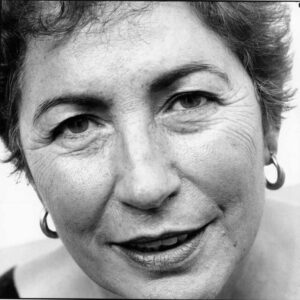MEMORY – Farewell to Masal Pas Bagdadi, psychotherapist and writer
 Psychotherapist and writer Masal Pas Bagdadi, who passed away at 86 last week, has dedicated many books to her work and life experiences. In A piedi scalzi nel kibbutz (Barefoot in the Kibbutz), published by Bompiani, she recounted her escape from antisemitic pogroms in Damascus, Syria, where she was born in 1938. Alone and still a child, she reached Mandatory Palestine during the winter between 1943/44, leaving behind her mother and sister. She dealt with that trauma in the new community into which she had been catapulted, Kibbutz Alonim, in Galilee. “At the time I was living in the kibbutz, they gave me a doll with a broken head. I repaired it and then told myself: things can be fixed, even in the head, that is, thoughts. This childhood act allowed me to heal the psychic wounds from the separation from my mother and family,” Bagdadi said in an interview.
Psychotherapist and writer Masal Pas Bagdadi, who passed away at 86 last week, has dedicated many books to her work and life experiences. In A piedi scalzi nel kibbutz (Barefoot in the Kibbutz), published by Bompiani, she recounted her escape from antisemitic pogroms in Damascus, Syria, where she was born in 1938. Alone and still a child, she reached Mandatory Palestine during the winter between 1943/44, leaving behind her mother and sister. She dealt with that trauma in the new community into which she had been catapulted, Kibbutz Alonim, in Galilee. “At the time I was living in the kibbutz, they gave me a doll with a broken head. I repaired it and then told myself: things can be fixed, even in the head, that is, thoughts. This childhood act allowed me to heal the psychic wounds from the separation from my mother and family,” Bagdadi said in an interview.
This early awareness led her to choose the path of psychotherapy as an adult, devising ways to help and support people, especially children. Moving to Italy in 1960, her commitment resulted in the publication of several books such as Amiamo il bambino che è in noi (Let’s Love the Child Within Us), dedicated to child education and parent-child relations. In Milan, she created the “Masal Play Center,” a kindergarten conceived as an oasis of play for the little ones.
Her psycho-pedagogical approach, as she explained in an interview with the Italian online newspaper Linkiesta, was strongly influenced by her childhood in Israel. “The idea of the kibbutz is that anyone must be put in a position to give the best, feeling the support of others. The individual does not exist without the foundation of the community they live in. So it is also in therapy,” she said.
In her book Mamma Miriam (Mother Miriam), dedicated to her mother, Bagdadi wrote about personal experiences, motherhood, pedagogy, and paths of teaching young people. To the meaning of life in the elderly, she dedicated Il tempo della solitudine (The Time of Loneliness), which recounts the lives of some guests of the retirement home of Milan’s Jewish Community with whom she had long lengthy conversations. Guests who live in a suspended time, between memories of the past, Jewish rituals, and the wait for their relatives’ visits. Another book, written at the time of the second Intifada, sadly remains timely since the title: Mi hanno ucciso le fiabe. Come spiegare la guerra e il terrorismo ai nostri figli (They Killed My Fairy Tales. How to Explain War and Terrorism to Our Children).
“With immense sorrow, we learn of the passing of Masal Pas Bagdadi. She supported and accompanied several generations of children and youngsters in their growth, who pay tribute to her, considering the relationship and work with her an inextricable part of their lives and approach,” stated UCEI President Noemi Di Segni. “She wrote and oriented people and institutions, drawing on her roots, her native land, and mother tongue as well as Israel and Hebrew, bringing them to life in our communities and schools. We will always be grateful to her for all that she was capable of recognizing, accompanying, and doing with sweetness and intelligence, with the restraint and authoritativeness of someone who personally experienced displacement and pain, as part of the larger Jewish people’s history,” added Di Segni.
“We will continue to draw on her knowledge as a point of reference and example of how her professional knowledge, combined with Jewish values and experience, reverberates and becomes an asset to an entire community, far beyond her own circle. May her memory be a blessing.”
